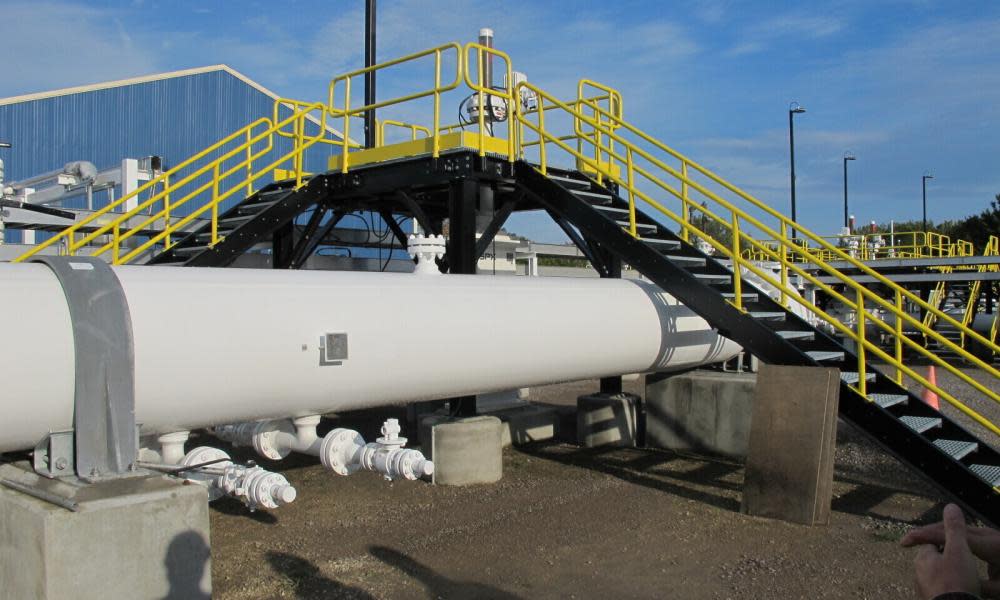Michigan orders closure of pipeline in escalating dispute with Canada

- Oops!Something went wrong.Please try again later.
The state of Michigan has told a Canadian energy company it must shut down a controversial oil and gas pipeline by Wednesday amid growing fears that a spill would be catastrophic to the region, in a feud which threatens to strain relations between Canada and the United States.
The company’s refusal to comply with the order, and swift support from top Canadian officials, highlights the politicized nature of pipelines, which campaigners have used as a target in the fight against climate change.
For nearly 67 years, Enbridge has moved oil and natural gas from western Canada through Michigan and the Great Lakes to refineries in the province of Ontario.
But Michigan says that one section to the pipeline – Line 5 – is too risky to continue operating.
Related: Shutdown of US pipeline after cyber-attack prompts worry over gas prices
In November, the Michigan governor, Gretchen Whitmer, announced a plan to revoke the easement granted to Enbridge, which permits Line 5 to cross under the Straits of Mackinac. Whitmer set 12 May as the deadline for the Canadian energy giant to shut down the pipeline.
“These oil pipelines in the Straits of Mackinac are a ticking timebomb, and their continued presence violates the public trust and poses a grave threat to Michigan’s environment and economy,” Whitmer’s office said in a statement.
The company says it has never experienced a leak in the underwater section of Line 5 and is currently working to tunnel beneath the lake bed to further improve the safety of the pipeline. But in the last two years, the pipeline has been struck by boat anchors and cables. And in 2010, a separate Enbridge pipeline spilled 3.2m litres of oil into Michigan’s Kalamazoo River.
Whitmer, who campaigned on shutting down the pipeline, has received support from Democratic attorneys general as well environmental campaigners and Indigenous communities on both sides of the border.
“Should anything that’s being transported in these 67-year-old pipelines get into the Great Lakes, it would have devastating effects and irreparable consequences,” said the Anishinabek Nation grand council chief, Glen Hare, who represents 39 First Nations across Ontario.
In February, a federal court ordered Michigan and Enbridge to enter mediation. Recently, Michigan has argued that the case should be heard by a state court, which could give it a more favourable judgment.
But international trade lawyer Lawrence Herman says that the United States, not Michigan, is legally bound to keep the pipeline running.
He points to the 1977 Transit Pipelines Treaty between Canada and the United States, which was ratified by the US congress.
“Regardless of what the state of Michigan may or may not want to do, the treaty is binding on the United States as a whole,”said Herman. “It’s a matter between the two governments: Canada and the United States.”
Both governments intended the deal to be a long-term arrangement, said Herman, pointing out the treaty requires either side give 10 years notice to withdraw.
“My point is, a deal is a deal,” he said.
Enbridge’s president, Al Monaco, has warned that a shutdown would have disastrous consequences for the country’s two most populous provinces, calling it a “very bad outcome”.
Line 5 delivers nearly half of the oil needs of both Ontario and Quebec, as well as propane for the state of Michigan.
Earlier this month, Canada’s natural resources minister said the continued operation of the pipeline was “non-negotiable” and warned that in addition to thousands of job losses, a shutdown would require 800 tanker rail cars and 2,000 trucks each day to move oil.
Canada and the United States have pledged to reduce emissions, but the two countries remain heavily reliant on oil. The precariousness of energy access was highlighted earlier this weekend after a key pipeline in the US was shut down following a ransomware attack.
In addition to lobbying by diplomats, the Canadian prime minister, Justin Trudeau, has raised Line 5 with Joe Biden, who has not yet commented publicly on the issue.

